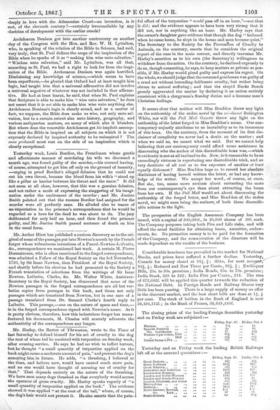Archdeacon Denison got into another controversy on another 'day of
the Congress with the Hon. and Rev. W. II. Lyttelton, who, in speaking of the relation of the Bible to Science, had said, very truly, that St. Paul defines the scope of the inspiration of the Bible when he speaks of it as "making him wise unto salvation." 4‘ Wisdom unto salvation," said Mr. Lyttelton, was all that, according to St. Paul, we had a right to look for from the inspi- ration of the Bible. Archceacon Denison was again horrified. Disclaiming any knowledge of science,—which seems to have been superfluous,—he gloried that Oxford had at least taught him logic, had taught him that a universal affirmative did not involve a universal negative of whatever was not included in that affirma- tive. He had at least learnt, he said, that when St. Paul explains that Scripture is able to make him "wise unto salvation," he does not assert that it is not able to make him wise unto anything else. Archdeacon Denison's logic is clearly sound, and as a matter of fact, we suppose, the Bible does make us wise, not only unto sal- vation, but to a certain extent also unto history, geography, and various antiquarian matters, on many of which also it blunders. But where does the venerable Archdeacon get his implicit assump- tion that the Bible is inspired on all subjects on which it is not -expressly declared by inspired authority to be uninspired ? The onus probandi must rest on the side of an inspiration which is -clearly exceptionaL






























 Previous page
Previous page